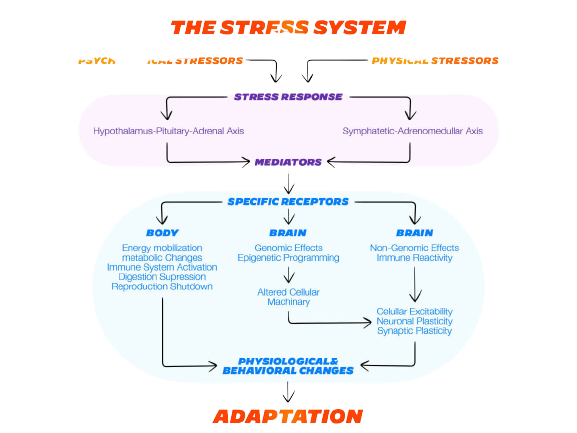Stress is a physiological reaction that every individual has to deal with from time to time. According to medlineplus, stress is a feeling of emotional or physical tension. It can come from any event or thought that makes you feel frustrated, angry, or nervous.
The human body is constantly being subjected to stressors in different forms—physical, mental and social. The main objective, once the stressor has been removed, is to recover and bring all systems back to their resting state via homeostasis (the capacity of the body to maintain the stability of its internal state).
Types of Stress
There are various types of stress that we need to be aware of. According to MedlinePlus, there are two main categories:
1.Acute Stress:
This type of stress is short-term. It goes away rapidly. You may have felt it in situations that your body wants you to become aware of through something new or exciting. Activities such as skiing down a slope, or slamming the brakes can activate this type of stress. It helps in managing various situations that could be labelled as dangerous by your body. Everyone experiences this type of stress at one point or another.
2.Chronic Stress:
This type of stress lasts longer than acute stress. When there are consistent stressors that go on for weeks or months, it can be labelled as chronic stress. Things like unhappy relationships, overload at work etc can lead to health issues if not managed properly.
How does stress on metabolic health work?
The perception of any threat on the body activates the flight or fight response via the HPA (hypothalamic–pituitary–adrenal) axis. This triggers systems in the body to improve the availability of glucose in the blood to meet the energy requirements to cope with stress. There is enhanced mobilization of energy and reduced uptake of glucose by the muscles. More fuel can be mobilised in response to larger or chronic stress, through gluconeogenesis in the liver. Gluconeogenesis involves the generation of glucose from non-carbohydrate substrates.

How are glucose and stress interrelated?
The sympathetic nervous system directs the body’s response to danger. Stress evokes the sympathetic nervous system thereby producing Cortisol (a stress hormone). Cortisol is the body’s natural alarm system which plays an important role in regulating blood pressure and blood sugar levels. In a stressful situation, cortisol causes increased glucose levels for an immediate energy source, inhibiting sensitivity to insulin production. Over time with chronic stress and chronically elevated glucose levels, the pancreas (which produces insulin to bring down glucose levels in the blood) loses the ability to respond to a high glucose stimulus, causing a reduction in the activity of insulin.
Does stress lead to Diabetes?
Chronic stress can place a high amount of load on the body during stressful situations and can indicate to the metabolic system to meet the requirements of the increased demand. This constant load can impact an individual’s immunity and predispose them to contract diseases that are caused by insulin resistance and alteration in glucose metabolism such as metabolic syndrome and diabetes. Chronic stressors also impair the function of insulin (causing Insulin resistance) affecting postprandial (after a meal) glucose metabolism.
Acute psychological and physiological stress stimulates the HPA axis which interferes with carbohydrate metabolism by increasing glucose availability and insulin levels. While the effects of acute stress are normal and given enough time to recover can even be beneficial, chronic stress can be a problem. Over time, chronic stress can lead to insulin insensitivity, altered glucose and insulin metabolism, which increases an individual’s propensity to develop type 2 diabetes. Constant exposure to chronic stress can lead to increased consumption of food, impacting metabolic health and weight gain. In due course, this can lead to glucose intolerance and cardiovascular diseases.
3 Ways to cope with and manage stress
While stress is a part of our lives, it is important to recognise and understand the various ways in which we can manage them.
1) Exercise
According to Harvard Health, the benefits of aerobic exercise don’t just go to your heart but also your mind. Working out helps reduce cortisol and adrenaline while stimulating the production of endorphins. These are the chemicals in your brain known as the body’s ‘natural painkillers’ that give feelings of relaxation and optimism.
2) Deep breathing
According to Harvard Health, deep abdominal breathing helps in completing the entire oxygen exchange. That means the benefits of the oxygen coming in for outgoing carbon dioxide can slow the heartbeat and lower or stabilize blood pressure. Deep breathing also goes by various names such as diaphragmatic breathing, abdominal breathing, belly breathing, and paced respiration.
3) Eat well
Foods can help counteract the effects of stress in many ways. Healthy eating can cut levels of cortisol and adrenaline that take a toll on the body over time. This can help counteract stress by lowering blood pressure and helping the immune system.
Conclusion
Stress is unavoidable and is important for the optimum functioning of an individual. Stress is not inherently bad, it is when it becomes chronic or when the stress levels are too high without a chance for the body to recover. That becomes harmful to the functioning of the body. By developing habits to manage and recover from physical, mental and emotional stress, one can improve outcomes for metabolic health and reduce the chances of developing diseases like diabetes and cardiovascular disease.
References
- https://www.ncbi.nlm.nih.gov/books/NBK538239/
- https://www.researchgate.net/profile/Richard-Surwit/publication/21730826_Stress_and_Diabetes_Mellitus/links/0f3175320cba750ed0000000/Stress-and-Diabetes-Mellitus.pdf
- https://doi.org/10.1038/s41598-020-58679-z
- Imaging Journal of Clinical and Medical Sciences
- https://www.thieme-connect.com/products/ejournals/abstract/10.1055/s-0030-1261924








